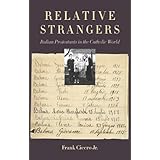
Average Reviews:

(More customer reviews)Are you looking to buy Relative Strangers: Italian Protestants in the Catholic World? Here is the right place to find the great deals. we can offer discounts of up to 90% on Relative Strangers: Italian Protestants in the Catholic World. Check out the link below:
>> Click Here to See Compare Prices and Get the Best Offers
Relative Strangers: Italian Protestants in the Catholic World ReviewBridgesBy Roger Taylor
Relative Strangers -- Italian Protestants in the Catholic World (Academy Chicago Publishers 2011)
Frank Cicero, Jr., taught me most of what I know about being a trial lawyer, so it was no surprise that his new book, Relative Strangers -- Italian Protestants in the Catholic World (Academy Chicago Publishers 2011), was a riveting learning experience. Cicero grounded the story of his Italian ancestors' immigration to and life in America in a context of religious reformation dating to the twelfth century. While telling the story, Cicero skillfully builds bridges between his ancestors' lives in Italy and the new lives they made in America, between Catholics and Protestants, and between the Italian "old neighborhood" on Chicago's northwest side and the melting pot of the city's western suburbs. These bridges reveal the history of Chicago immigration at the turn of the 20th century from the vantage point of individual lives of the immigrants who made that history.
Not all Italians are Catholic. The Waldensians in France, Germany, and northern Italy began to espouse views and adopt practices contrary to Catholic teachings long before Martin Luther was born. Yet surely I am not alone in having first become acquainted with this Protestant sect from reading Cicero's book. The book explains enough of the history and beliefs of the Waldensians to give the reader a keen understanding of the depth of the families' disapproval of the marriage, in 1935, of his Sicilian Catholic father to his Waldensian Protestant mother. That history also shows how remarkable it was that his father consented to the Cicero children not being raised Catholic.
Cicero documents the journey of his Waldensian maternal grandparents from their harsh life in the beautiful but unforgiving mountains of northwestern Italy to Chicago through Ellis Island. He reveals the depth of his research by noting the little appreciated fact that Ellis Island, an American monument to immigration, was the entry point to the United States for immigrants in steerage, such as his grandparents. First and second class passengers landed at the Battery and "were expedited on their ways."
His Catholic paternal grandparents each had married, started families, and became widowed before leaving Sicily for a better life in America. They met in Buffalo, a bustling city in the early 1900s and a destination for many Italian immigrants. They joined their lives and combined their families but left no record of ever marrying. In 1904, they pulled up and abruptly left for Chicago, for reasons that Cicero could not pin down for certain, perhaps to escape an extortion threat by a gang of southern Italians.
Cicero uncovered rich details about the Italian neighborhood on Chicago's near- northwest side that was home for both sides of his family in the early 1900s. He brings alive the exhausting and menial work of the men, the crowded living conditions in which the women raised children, and the smells of coal smoke, out-of-order toilets, and horse traffic, which then were part of immigrant life in "the fastest growing city ever." The families' moves to the "sticks" (the then remote and barely populated western part of the city) and eventually to the suburbs led Cicero and family members of his generation to abandon the indicia of their Italian heritage. They became American, not Italian, with the implicit consent, if not the encouragement, of their elders.
Cicero treats the family's religious lives almost tenderly, though with more details about his mother's Protestant family than his Catholic father's, perhaps reflecting a disparity in available records. The history of Chicago churches and settlement houses that served his ancestors and other Italian immigrants in the early 1900s comes alive thanks to his meticulous research. Cicero unabashedly acknowledges the importance of religion, to this day, to him and his family, whose Protestant, conservative, and evangelical faith can be traced to generations of Waldensian ancestors.
While telling his story, Cicero demonstrates the need for painstaking research in crafting a family history, but he also acknowledges the role of downright luck. He shares the disappointing dead ends in his research and his regret in not talking to grandparents more about their experiences while they were still alive -- good lessons for any would-be genealogist and for us all.
What captivated me most about Relative Strangers was how the author brings the reader along on his visits to municipal archives in Italy and to church records there and in America. He includes us in his sightseeing -- and takes us with him for some savory Italian meals! We share his palpable excitement as he gathers the strands of his immigrant family history and weaves them, with skill and pride, into the fabric of the American dream.
Roger L. Taylor
(Taylor practiced law with the author for 30 years at Kirkland & Ellis LLP in Chicago, becoming of counsel in 1999. He retired in 2011 after ten years as president of Knox College.)
Relative Strangers: Italian Protestants in the Catholic World Overview
Want to learn more information about Relative Strangers: Italian Protestants in the Catholic World?
>> Click Here to See All Customer Reviews & Ratings Now
0 comments:
Post a Comment